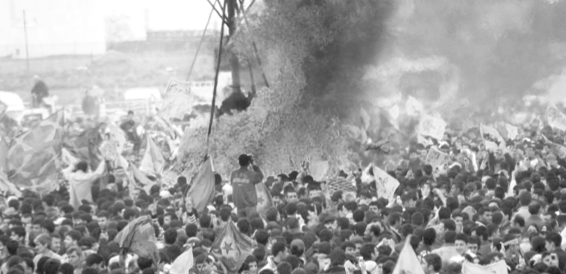
In Turkey, March 21 is a day of chaos and turmoil instead of peace and hopes of a new year. This trend is hopefully soon to end. Molotov cocktails, gas bombs, panzers, flying stones, vandalized shops, broken pavements and turmoil. Such is a typical scene from March 21 (Norouz) celebrations in Turkey. A day that is highly associated to ethnical identity of Turkey’s Kurds, the everlasting picture of chaos is changing due to the democratization process in Turkey. March 21, symbolizing the new year in Persian culture as well as in many central Asian and Mesopotamian cultures, holds a significant place among Kurdish people in Turkey. Not only areas where Kurdish people live, but all Turkish metropolises have an experience with March 21 celebrations. Dressed up with their ethnic costumes in red, green and yellow – still a controversial combo in Turkey- millions of Kurds start gathering from March 18th until March 21st. The festival hits its verge when men and women enjoy themselves dancing traditional folklore and jumping over the colossal “Newroz” fire. However, the celebrations are usually associated with the Kurdish insurgent movement and Kurdistan Workers’ Party (PKK), which is recognized as a terrorist organization by Turkey, the U.S. and most international authorities. The big crowds’ enthusiasm flavored with romantic Kurdish nationalism often ends up with slogans against the unity of Turkey and the imprisonment of Abdullah Ocalan, the leader of PKK. This is mostly the moment that triggers the same chain of events almost every year since 1980s in Turkey: The Turkish police’s call to the protestors to cease celebrations, the Kurdish protestors’ violent response with stones and Molotov cocktails, the police’s counter response with gas bombs, clash, riot, innocent suffering among the guilty and so on. A day annually expected by international freelance journalists eager to have some field experience, March 21 was synonym of catastrophe for Turkey’s reputation of human rights and democracy. Therefore, the Turkish government started taking measures against the inevitable violent “tennis match” of events: In 1995, “Nevruz” was proclaimed to be a holiday in Turkey, emphasizing on the fact that the festival was celebrated among the Turkic Republics in Central Asia and throughout the history. In the late 90s, it was a trend among Turkish politicians to wear Caucasian style hats and toast cooked eggs among each other in “Nevruz” holidays. The new holiday “Nevruz”, however, provoked less popularity on the Turkish side and more controversy on the Kurdish side: A new opposition, regarding how the March 21 holiday should be called was at stake. Nevruz or Newroz? The controversies over the holiday’s name and annual domestic turmoil seemed to continue in Turkey, until the country took critical steps towards democratization and human rights in the last years. The partial recognition of Kurdish cultural rights by establishing state-run Kurdish channels and the encouragement of local administration in Kurdish-populated areas turned the winds into a relatively optimistic direction in Turkey. As a result of this, the last year’s March 21 celebrations took place in “calmer” atmospheres, in a manner that the innocent was not a victim of the guilty. Organized by Kurdish political movement party, BDP, this year’s March 21 celebrations ended in a quiet atmosphere, still under tight security measures. Setting up the colossal fire and releasing doves, the Kurdish politicians gave their public messages of democratic solution to Kurdish identity question in Turkey and insistence on peace. “I hope the Nawruz will herald a new era of mutual respect, love, study together, solidarity and a much better Turkey,” said Abdullah Gul, the President of Turkey. The media coverage was optimist, too: The overall of national and international media coverage glorified the “tranquility” of Nevruz/Newroz 2010, leaving no room for those who wanted to turn this year into another cliché of conflict. Rusen Cakir, a well-known Turkish journalist with a background of the issue for over 20 years, wrote in his column about the secret recipe for this year’s success in Turkey. First of all, Mr. Cakir stated that the recognition (despite not officially yet) of Kurdish identity and language by the Turkish government made a relieving affect on the Kurdish people of Turkey. “A foreign journalist who participated in the celebrations,” continued Cakir, “would never believe that speaking Kurdish in public, listening to Kurdish songs and dressing up in ethnical Kurdish costumes were never banned in Turkey” Second, Mr. Cakir highlighted the role of Turkish Police in managing the escalation of the conflict: “Every year, it would be sufficient for the police to see a poster of Ocalan’s poster to ban all celebrations in whole. This year, they did not do that.” Third, Mr. Cakir mentioned the current government’s understanding of Kurdish local politician’s influence on Kurdish people. However, Mr. Cakir stood from a skeptical point of view of the government’s willingness to approach these local politicians. Even though slightly, there were some encouraging scenes that would demonstrate the normalization –rather than official reconciliation- between the peoples of Turkey: Turkish Police versus Kurdish kids, a scene where kids were throwing at Police was replaced this year by another one where they were playing football and exchanging presents with each other. Turkish-Kurdish opposition on the March 21 is still far from portraying a picture of ultimate non-violence. Somehow, both sides are now feeling the warmth of festival fire on their cheeks for the hope of a future joint-celebration.
